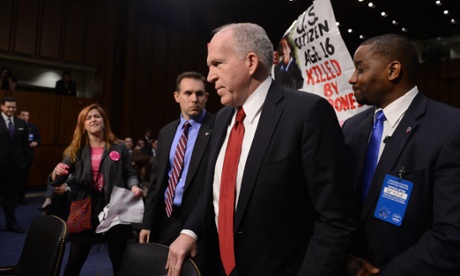The law of war does not shield the CIA and John Brennan's drone kill list
Morris Davis
 |
| CIA director nominee John Brennan confronts protesters at the US Senate. Photograph: Saul Loeb/AFP/Getty Images |
The US prosecuted Omar Khadr in Guantلnamo for not being a lawful combatant. Exactly the same applies to the civilian CIA
February 11, 2013
The disclosure Tuesday evening of the Department of Justice white paper on targeted killing (pdf) has sparked a lot of debate, much of it focused on theObama administration's extraordinarily broad interpretation of what constitutes an "imminent" threat that justifies lethal force as an act of self-defense. AsSenator Rand Paul (Republican, Kentucky) told reporters during a conference call on Wednesday, "only a team of lawyers could define 'imminent' to mean the exact opposite" of what the word means in the real world.
There are, no doubt, many Americans alive today who should be thankful their healthcare providers did not apply the administration's interpretation of "imminent" to decide if they had crossed over the line of imminent death and said pull the plug.
Some people have acquired power and profits in post-9/11 America by pandering to and perpetuating fear. As has been the case on a range of legal issues – torture, indefinite detention, warrantless surveillance, kill lists – all it takes is for someone to say "terrorism" and "threat to security" in the same breath for the vast majority of the public to handover its principles. Rather than a serious discussion on the proper law/liberty/security balance, too often the public accepts the false syllogism that whatever it takes to stop "them" from hurting "us" is obviously, as White House spokesman Jay Carney might say, "legal, ethical and wise".
Targeted killing falls into that category. The discussion tends to glom what should be several discrete inquiries – where will the lethal operation take place; who is the imminent threat and why; who will conduct the operation; and what laws apply, among others – into one big ball that slides through with little scrutiny.
The DOJ white paper discusses the right to take military action against a US citizen who is part of the enemy forces, law of war principles that govern application of military power, judicial deference to military judgments in the conduct of warfare, and combatant immunity that gives legal sanction to a deliberate killing by a member of the armed forces acting in compliance with the law of war. In and of themselves, those are all very valid points.
What the white paper ignores, however, is that the US has both a military and a CIA drone program, each one subject to its own rules. The CIA is a civilian agency with civilian employees and civilian contractors. It is not part of the US armed forces and its drone program is not immune from liability by the law of war principles that might apply to the military drone program.
The deliberate killing of another person is generally murder unless it is excused by some valid legal justification, like the law of war's combatant immunity. For example, the United States charged Omar Khadr with committing murder in violation of the law of war for throwing a grenade and killing a US service member during a battle in Afghanistan.
At his military commission trial at Guantلnamo Bay, Cuba, the military judge explained to Khadr that the law says a "killing is unlawful when done without legal justification or excuse" and that "the phrase 'in violation of the law of war' means a person … acting as a combatant [who] did not meet the requirements for being a lawful combatant." Khadr pled guilty to the charge and is now in prison in Canada serving a sentence for war crimes.
Under what authority is the CIA legally excused for deliberately killing?
The United States has never made – nor should it – the argument that the CIA is part of the US armed forces and governed by the law of war. The fact that the two entities are separate and operate under distinct rules is clear. John Brennan, President Obama's nominee to head the CIA, made the point in his answers to prehearing questions (pdf) from members of the Senate select committee on intelligence:
"The president must have the ability to select which element [the CIA or Department of Defense] is best suited for the particular mission. Factors to be considered in the selection of the personnel and authorities include the capabilities needed, the material required, and whether the activity must be conducted covertly."
Stated another way, Brennan says that President Obama needs to have a paramilitary force at his disposal to carry out operations the military is prohibited from conducting by the law of war.
Jack Goldsmith, former assistant attorney general in the George W Bush administration and now a professor at Harvard Law School, argues the past decade shows that the United States needs a new statutory frameworkgoverning how it conducts secret warfare. Perhaps that would be a positive step, but a new domestic statutory scheme would not make a civilian working for a civilian agency a lawful combatant entitled to immunity under the law of war for acts committed outside the United States.
Neither Congress nor the president has the power to create a legal justification for killing in violation of the law of war.
No comments:
Post a Comment